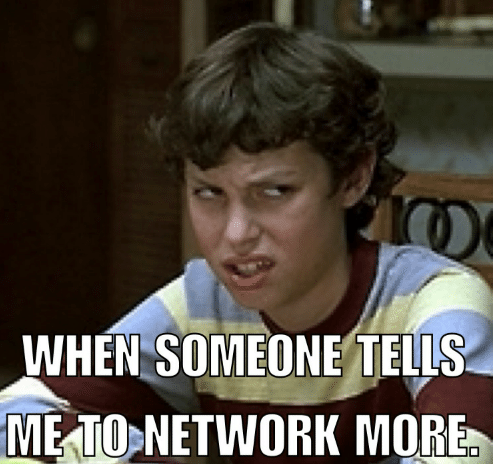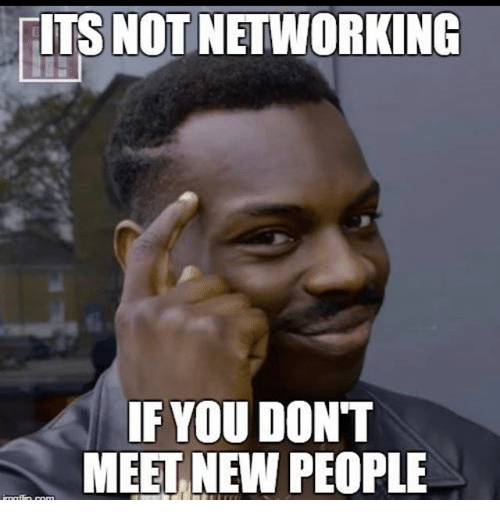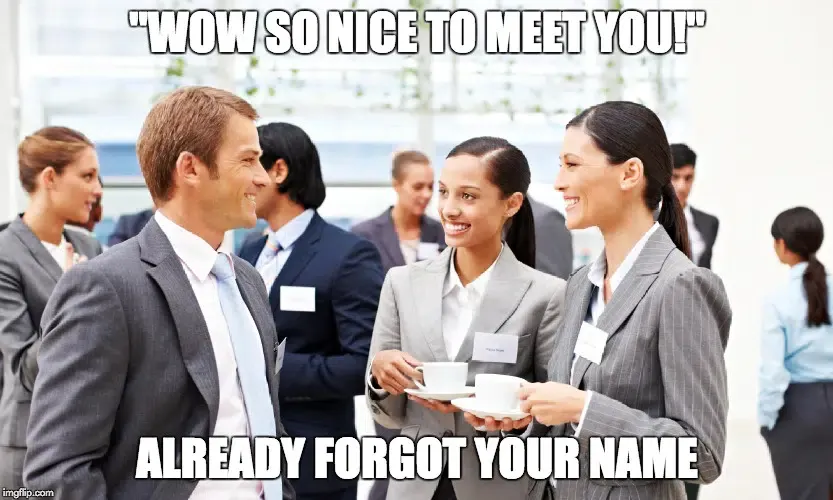9 Ways to Get More Out of Networking by Being Intentional
Networking events don’t have to be terrible. Learn how to take a more intentional approach to how you spend your networking time.

I don’t think I am alone in feeling a bit of dread when it comes to networking events and conferences.
My inner introvert wants to curl up in a ball in the corner as I think about the feeling of walking into a room of acquaintances to make small talk about the weather or how good/bad the local sports team is (in my case, they are usually complaining about the Oilers). I can almost feel myself standing in uncomfortable shoes, drinking cold coffee out of a tiny hotel cup, and plastering a smile on my face as I count down the minutes until I can politely excuse myself.
And now we also have online networking events added to the mix, which adds additional layers of challenge with glitchy technology, poor sound quality, and unclear social norms. Now it’s sitting in your living room in your yoga pants and blouse combination, hoping your kid/pet/partner doesn’t cause a scene behind you while you try to introduce yourself in a breakout room.
😬😬😬
Going to an event, or attending one online, and leaving feeling terrible is a waste of your time and energy.
BUT…This doesn’t mean you should forgo events altogether. It doesn’t have to be this way!
Instead, you can take a step back and, you guessed it, take a more intentional approach.
The following are the intentional approaches you can take to attend fewer networking events and get more value out of the ones you do attend.

9 ways to get more out of networking by being intentional
1. Get clarity on the type of people you want to meet
The whole purpose of networking is to connect with the right people, so you need to go in knowing the kind of person you want to connect with.
Some examples:
- Are you trying to meet new potential customers? What makes them a customer?
- Would you like facetime with a potential mentor? Who fits this relationship?
- Do you want to recruit new employees? What attributes do you want in an employee?
- Are you interested in reconnecting with a former supplier?
Each of these types of people may be at a wide variety of events--so consider who you are looking to meet and target your events appropriately.
2. Decide which organizations you want to be involved with and what you get out of that relationship
There are a lot of accelerators, business groups, and non-profits out there. Each with many events, learning opportunities, and fundraisers throughout the year.
What do you want out of your involvement with them?
- Is it an organization you are passionate about and want to help succeed?
- Is it a business group that you know has a good mix of potential clients and connections?
- Is it an entrepreneurial accelerator that has a lot of learning opportunities for you to build your skills?
- Is the organization locally focused, provincially/state-wide, national, or international? n
Once you know which organizations to target, you can intentionally decide the level of commitment and time you are willing to invest.
For example, it could be board membership, monthly volunteering, attending their annual events, or as a financial donor. These all have different aspects of networking with different commitment levels and different potential outcomes.
3. Set a goal for what you want to get out of each networking event
Before you walk into an event, set a goal. Think about why you are there and what you are trying to achieve.
- Is it face-time with potential customers? How many?
- An introduction to a particular vendor? Why?
- Are you interested in the content being presented as a learning opportunity? What is the takeaway you hope for?
- Do you want to interact with other players in your industry? To learn what?
- Do you want to find a partner in a complementary industry to help you with a particular project? What attributes does that partner have?
Knowing what you want out of the event allows you to focus your actions on that outcome. You are able to be more intentional about the questions you ask, the people you approach, and it gives you the motivation to excuse yourself from the conversations that don’t align with your goals.
4. Research your event options, set a budget and put them in your calendar
Once you know who you want to meet, what you are looking to get out of the events, and which organizations you want to be involved in, you can go look for them:
- Scour meetup websites for potential events
- Follow people and organizations on social media to see what’s going on
- Ask relevant people in your current network if they have any events on their radar
- Decide if you want to focus on in-person or online events or a mix of both
Make a spreadsheet to track it all. This will give you a list of available opportunities so you can narrow your options.
Try this networking event tracker spreadsheet template to get started.
When you have your list:
- Figure out how much you want to spend each month or year and set a budget.
- Work out which events are likely to give you your biggest bang for your buck based on who you are trying to meet and what you are trying to achieve.
- Reflect on your life commitments and decide how many events you think you can reasonably attend in a week or month without burning yourself out.
- Enter the events in your calendar so you know when they are coming up and can plan your time accordingly.
5. Take a networking buddy or find the other solo people
For in-person events, it can be intimidating to go to events on your own so consider partnering up with a friend or colleague to attend some of your chosen events. You may be able to introduce each other to new people and ease the transition into new conversations.
My only caution here is to use your networking buddy as a touchpoint, not a crutch.
For example, my husband and I learned early on that we cannot attend most networking events together because we end up just wanting to hang out with each other! You will not likely get much out of going to an event if you spend the whole time huddled up with your friend.
Alternatively, find the other solo people. They likely feel just as awkward as you do, sitting alone at a table or hovering at the edge of a group. Throw them a lifeline and introduce yourself.

6. Put your phone away
I have been guilty of using my phone as a way to not look like I am standing by myself awkwardly but rather reading something very important.
I get it. Interacting with others, especially strangers, is hard and it’s natural to want to stand in a corner or sit at a table looking at your phone. It feels safer. Unfortunately, it also makes you seem unapproachable.
Put your phone away and smile at people. Someone will eventually smile back, throw YOU the lifeline, and make an opening to break into their group.
7. Ask questions and be curious
Once you do start talking, try to break out of small talk as fast as possible. Ask lots of questions! People generally like to talk about themselves and it is an opportunity to learn about them.
You will, of course, want to (and should!) share about yourself too, but be mindful that you are not the focus. There is nothing worse than walking away from a conversation and realizing that you know nothing about the person you were talking to.
You are way more likely to achieve the goal you set at the beginning of the event if you are being intentional about learning more about others, not just talking about yourself.
That, said, be careful not to overdo asking questions: networking with someone isn’t an interrogation. A conversation goes both ways.
Not sure what to say about yourself? Share the reason you are at the event, something like: “I’m here to meet with people from this non-profit and learn how I can be involved, any suggestions about who I should talk to first?”
For online events, one-on-one connections are much harder. Utilize the chat function to directly message someone if you have questions about something they said or want to connect further.
8. Take a few notes after each event
At the end of each networking event, jot down any relevant notes or comments about the people you met, the conversation you had, or the event itself. They will help you remember names and details about your conversations.
It can be an incredible advantage in building goodwill when you bring up details of past interactions with people you see at events regularly because it shows you were paying attention and were genuinely interested. Good notes also avoid the embarrassment of not remembering a past interaction.
You can refer to the notes before other networking events and arm yourself with conversation starters.
Notes are also a very powerful way to be intentional because they force you to reflect on whether the event was worth your time. If you don’t take the time to reflect on if the event was a good investment, you aren’t able to track if you made progress toward your goal.

9. Follow-up with people you connected with soon after the event
If you did make a few good connections at an event, both online or in-person, immediately follow them on whichever social media platforms seem reasonable. If appropriate, send an email follow-up within 24 hours, while the event is still top of mind and they still remember your conversation.
Consider if there is an action you can take to solidify yourself in the other person’s mind. Things like:
- An article to share related to your discussion
- An introduction to someone who might help them
- A thank-you note for a great conversation
- A request for a coffee meetup to continue your conversation
Networking events don’t have to be terrible. In fact, with a little planning and intention, they can even be awesome!
As the world opens up to in-person events, continues with online events, and tries out hybrid events, the options to connect are many.
You have a lot of power over how valuable your experience is by being intentional about the who, what, why, and how of each event. Try tracking your networking events in this handy spreadsheet!
Reach out if you want help to set a strategy to make your networking efforts more effective and better use of your time and energy.
Share
Ashley Janssen

Productivity consultant, writer, speaker, serial entrepreneur, chaos calmer, introvert, cat-lady. Lover of books, fitness, old fashioned’s, basketball, and video games.
Follow me on
Twitter
or
LinkedIn.
Hire me for
1 on 1 productivity consulting
or
speaking.
Related articles

When You Do Things Matters

What If Being Lazy Was a Good Thing?


Comments ()